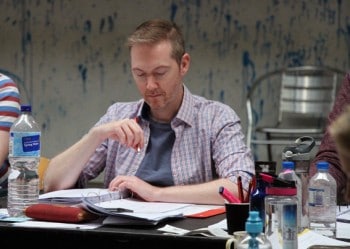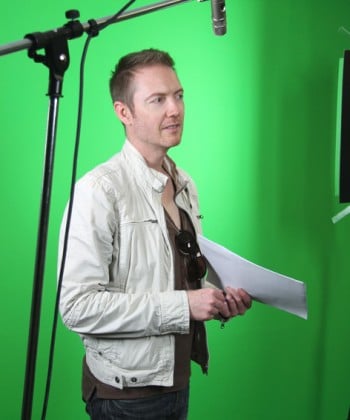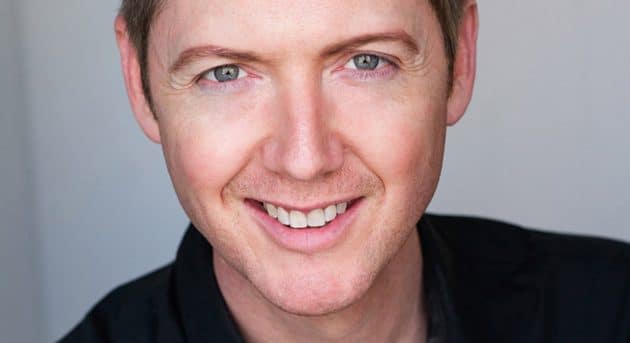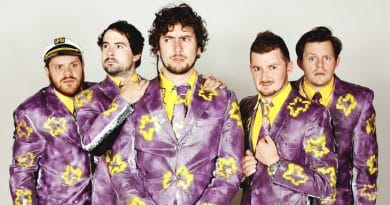Jason Langley on what makes a Director’s Actor
A strong relationship between actor and director is one of great importance in order for their best work to be brought out and for the success of the production. While it does vary greatly between each director and show, there do seem to be common factors that promote the sought after ‘director’s actor’: an actor who manages to maximise the most productive working relationship, and as such, are hired again and again.
Hot off his Green Room Award win for Best Direction in Vic Theatre Company’s Loving Repeating, Jason Langley’s acting and directing career spans a vast variety of musicals, plays and more. He is currently directing the Squabbalogic/Sydney Philharmonia Choirs’ co-production of Leonard Bernstein’s Wonderful Town, playing at the Sydney Opera House on May 7 and 8, before returning to Melbourne towards the end of the year to direct The Production Company’s third show of 2016; Dusty. I was fortunate to work under Jason’s directorship in WAAPA’s production of Legally Blonde: The Musical last year. For every actor who has also been lucky enough to work with him, I’m sure you understand the attention to detail, the intelligence, and the creative and collaborative approach he brings to every project, as well as his immense passion for his craft.
So naturally, I thought I’d share my coffee this week with director Jason Langley, as he explores just what comprises the qualities of the director’s actor.
What personality traits make an actor more desirable to work with?
Certainly for me, I like an intelligent actor. I think it’s really important for an actor to be well read and well versed in style, and I think the only way you can be well versed in style is to read novels, to read plays of all different genres and to watch movies made pre 1960s. Style is something you can’t teach. Style is something that you osmose, that you learn growing up, you learn through experience and observation.

Do you think it’s an intelligence through life experience as well: having a range of experiences to draw on?
Life experience is wonderful, but your experience evolves and changes the older you become. Your life experience is quite a different kettle of fish when you’re 21 and newly graduated, to when you’re 60 with all those years of living behind you. Its important to be well read and well versed: that’s a great help. But I also like an actor who isn’t afraid to commit their being whole-heartedly to a rehearsal process, as opposed to coming in and saying, ‘I’ve got a variety of choices I could make’ and I’ll half heartedly embrace these choices for you just so we have a little tasting plate: that’s a bit wishy washy for me. I love an actor who will commit to a choice and then be able to respond and know if it’s not the right one. If it’s not the right choice, then be able to commit whole-heartedly to another choice until we find the character in the actor and the actor in the character.
Also, I appreciate an actor who doesn’t only rely on the director having the answers. Because a director doesn’t necessarily have all the answers. A director works just as intuitively as the actor, and is just as invested in the discovery process as the actor. Of course a director will come in with an initial idea, and to a certain extent where a musical’s concerned, many decisions have been made early on in the design process. However, the rehearsal room floor to me is a crucible of ideas and a playground. So I will always come in with an initial idea, but I always understand that someone might have a better idea, and I’ll allow mine to change or to evolve with what the actor has to offer.
What do you want an actor to have done in terms of preparation for the first rehearsal?
Research. I think a lot of people underestimate the value of research. Even the smallest amount of research can open up windows and doors to character or story, and allow us to be greater storytellers. This also means working smart with that research. I’ve encountered actors who arrive having done all this background work on their characters where they’ve written a whole backstory and autobiography of their character. But sometimes it’s without basing their detective work on the text that’s in front of them. And they can do all of that work and find that the director has a completely different concept for the piece, and that can make it very hard for the actor to step back from and create in a new way. So it’s about working smart. I would always come in being well researched on the piece, the ideas, and all the concepts surrounding the piece. I would know everything I possibly could about my character using everything the playwright has given me. This is good groundwork to then enable you to explore and layer character in the rehearsal room.
However, let me preface all of this with the fact that these are just the ways I work. Directors are like snowflakes: no director is the same as another director. They all have their different ways of working, their different methodologies and approaches. Although, an intelligent actor who can jump in and make committed choices, and be willing to explore and play, to question and challenge the text – I think that’s a dream for any director.

Apart from suitability to a role, what inspires you in an audition room to want to cast someone?
As an actor, you can’t walk into an audition room and second-guess anything. That’s really time wasting. All you can do is walk into the room and go, ‘this is me, and if you cast me, this is what you’re going to get. This is going to be my take on the character.’ You can’t second-guess what a director wants, because a director will have his or her own concept and conceit of the play in question. I’ve certainly worked on projects where the other creatives have had a very different idea about the way they see a character. So all you can do is walk in and give them the best version of what they’re going to get with you.
As a director, when you sit on this side of the audition room, you learn so much. It would be great if all actors could sit on an audition panel at some point. Because when someone walks into the room, you can tell immediately if they’re right for your vision of the role or not. If they are right for your vision, you can hope they read well, inhabit a character well. In a musical audition, you hope they can sing well and reach all the technical requirements that the particular role needs musically. Generally, when someone walks in and they don’t quite fit your concept of the character, it can be difficult for them to change your mind, but it does happen. And that’s not through anything the actor can do, except be the best version of themselves on the day and make strong, committed, interesting choices.
I suppose it comes down to that knowledge that audition panels want you to do well, they’re always on your side.
You always want to cast the next person that walks in. You never want someone to walk in and be terrible. But someone can challenge your concept of the character. I was casting a show once where I needed someone who was 50+, and an actor- who’s doing incredibly well at the moment- walked in, in his 20s, not long graduated from drama school. The writers were on the panel, and you could see them thinking, ‘what’s he doing here?’ But I wanted to give him a go, just as an alternate choice. And he knocked his audition out of the ballpark. He came in having made strong choices. One of the writers leaned into me and said, ‘you know what? We could make a tweak. He wouldn’t have to be this person’s father, he could maybe be their uncle.’ And I said, ‘do you like him? Would you be willing to make that change?’ And they said, ‘yes.’ And so we auditioned him thoroughly and he nailed every moment. He completely changed the writer’s take on the character. And I was more than happy to adjust my thinking and my concept because he was that good. So it can happen.
If you’re not right for the role, you’re not right for the role. But if you come across as a person who is intelligent, can make intelligent choices, make choices that challenge me as a director, and be a person that I can see yourself getting on with in the rehearsal process, then you may well have a chance at the role. Ideally, you want to work with people who you think you’ll have a good relationship with in rehearsal. Certainly I do. I like a fun, playful rehearsal room. I like a team that is working happy. That’s not say that I’m lenient on good, solid hard work, but I like balance in a rehearsal process. For me, that’s when the best work blossoms.




